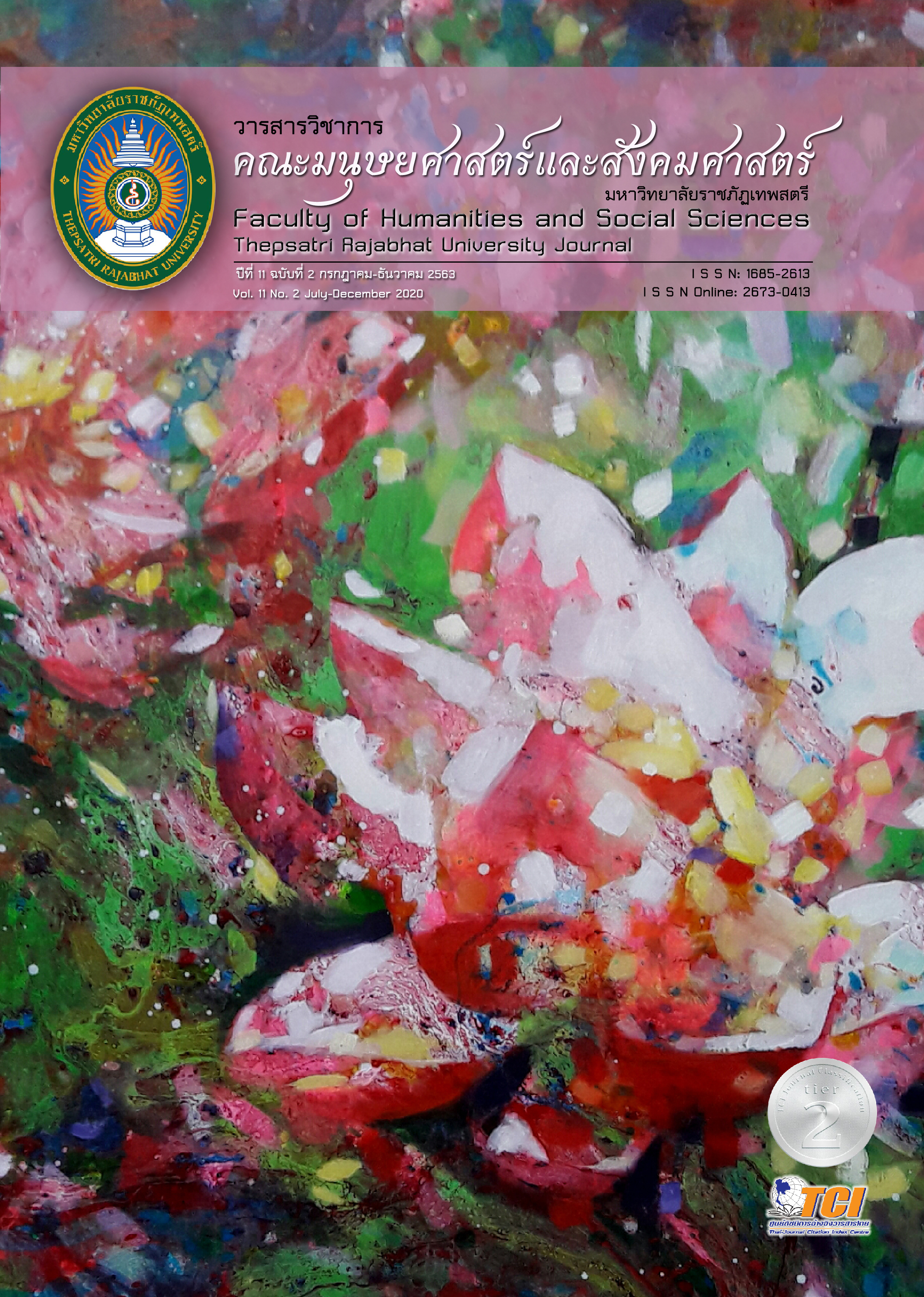Impact of Sufficiency Economy Philosophy on Textile Business of Thai-Chinese Entrepreneurs : A Case Study Bobae Market ผลกระทบของปรัชญาเศรษฐกิจพอเพียงที่มีต่อธุรกิจสิ่งทอของผู้ประกอบการคนไทยเชื้อสายจีน กรณีศึกษา ตลาดโบ๊เบ๊
Main Article Content
Abstract
The main objective of this research is to study the effect of the Sufficiency Economy Philosophy on the textile business of the Chinese people in the Bobae market. The research consisted of 345 questionnaires and interviews with 10 related persons using descriptive statistics, percentage, mean and standard deviation. The research found Sufficiency Economy Philosophy has a quantifiable impact. that Applying Sufficiency Economy Philosophy has the effect of making business prosper, understanding the present situation with moderation. To be able to stay steady with access to theoretical and applied theories using rationality .Sustainable development can be done in the future with the principle of immunity. Examples of such effects. Material Handling from Upstream to Downstream Design their own products Domestic and foreign markets. Maintain the standard of Thai textiles. They are shared with the community. Quantitative Impact on Thai-Chinese Businesses Relieved from Economic Crisis Have a better life Be ready to change in the context. They have the ability to encourage their children to receive good education, knowledge and virtue in the management of family affairs cause. Know how to solve And can prevent future risks. The results showed that the mean was 3.89 and the standard deviation was .569. Qualitative impact makes a business an asset. The performance of the Company is significantly higher.
Downloads
Article Details
The content and information presented in articles published in the Academic Journal of the Faculty of Humanities and Social Sciences, Thepsatri Rajabhat University, are solely the opinions and responsibilities of the respective authors. The editorial board of the journal neither necessarily agrees with nor assumes any responsibility for such content in any manner whatsoever.
All articles, information, content, and images published in the Academic Journal of the Faculty of Humanities and Social Sciences, Thepsatri Rajabhat University, are the copyright of the journal. Any person or organization wishing to reproduce, disseminate, or otherwise utilize all or any part thereof must obtain prior permission from the Academic Journal of the Faculty of Humanities and Social Sciences, Thepsatri Rajabhat University.
References
Areewan Oumtanee. (2016). Qualitative Research in Nursing. CU Press.
Guntalee Ruenrom. (2013). Applying the philosophy of Sufficiency Economy in Policies and Marketing Plans of Small and Medium Enterprises (SMEs). Chulalongkorn Business Review, 135, 49-79.
Kanjana Boonyoung, Tienkaew Liemsuwan & Ausanakorn Tavarom. (2009). Sufficiency Economy Philosophy in Sub-district Administration Organization. Research Paper Supported by The Seceratiat of the Senate.
Krejcie, R. V., & Morgan, D.W. (1970). Educational and Psychological Measurement. Determining Sample Size for Research Activities, 30(3), 607-610.
Lincoln, Y. S. & Guba, E. G. (1985). Naturalistic enquiry. Beverly Hills, CA: Sage Development. Chulalongkorn Business Review, 136, 59-90.
Nisada Wedchayanon & Sunisa Chorkaew. (2014). The sufficiency economy and people-centered development. European. Journal of Training & Development, 38(9), 822-844.
Oranuch Pructipibultham. (2010). The sufficiency economy philosophy and strategic HRD: a sustainable development for Thailand. Human Resource Development International, 13(1), 99-110.
Pathama Waithayawongsakul. (2011). The Strategy of SMEs Establishment Base on Tax Benefit Right and Financial Budget in The Sufficiency Economy Concept. Chulalongkorn Business Review, 129, 55-75.
Pichamon Chansuchai. (2019). The value-added product of community enterprise according to sufficiency economy toward sustainable development of entrepreneurs. Polish Journal of Management Studies, 20(2), 174-185.
Prakong kannasut. (1999). Statistics for Behavioral Science Research. Bangkok: Chulalongkorn Press.
Pravet vasi. (2004). The Sufficiency Economy. from http://www.thaingo.org/cgi-bin/content/ content2/show.p?0357.
Siriporn Chirawatkul. (2012). Qualitative Study in Nursing. S. Asia Press.
Siriwut Buranapin & Thankawin Ratthawatankul. (2015). PHILOSOPHY OF SUFFICIENCY ECONOMY AND BUSINESS SUSTAINABILITY: A FRAMEWORK FOR OPERATIONAL IMPLICATIONS. Journal of Business & Behavioral Sciences, 27(1), 107-133.
Sumet Tantivejakul. (2012). Sufficiency Economy Philosophy. [online]. Accessed on November 12, 2016, from www.chaipat or.th.
Supaporn Bumrungyoung. (2015). An Application of Sufficiency Economy Philosophy for the Organic Agricultural Producers and Distributors under The Standard of Organic Thailand’s Brand. Burapha Journal of Business Management. 40, 72-87.
Thanawut Pimki & Jantana Ridsomboon. (2014, January - April). The Practical use of the Royal Sufficiency Economy with Community Enterprise in Chanthaburi Province. SDU Res J, 10(1).
Theeranuch Pusaksrikit, Siwarit Pongsakornrungsilp & Pimlapas Pongsakornrungsilp. (2013). The Development of the Mindful Consumption Process through the Sufficiency Economy. Advances in Consumer Research, 41, 332-336.
Wanida Wadeecharoen, Athiwat Kanjanavanikul, Rungsun Lertnaisat & Sombat Teekasap. (2013). Thailand International Investment Position and The Role of Small and Medium Enterprises (SMEs). International Joint Ventures (IJV). In Thailand Economic Rice PL. and Ezzy D. (1999). Qualitative Research Methods: A Health Focus. New York; Oxford University Press.
Wikipedia. (2015). Bobae Market. from http://th.m.wikipedia.org.
Yates, Andrew J. (1997) A Sufficiency result for constrained economics. Journal of Mathematical Economics, 27(4), 411-423.


